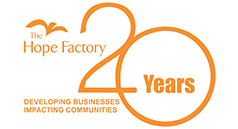Our future for life
Accounting for the future
The accounting profession, through the South African Institute of Chartered Accountants (SAICA), is passionately committed to job creation and training. The evidence of such commitment and involvement is in SAICA's corporate social investment (CSI) initiative, The Thuthuka Hope Factory Wealth Creation project.
The Hope Factory, founded in 2001 in a Plumstead garage, Cape Town, focuses on training and job creation. Training is provided in: Technical Skills (sewing, patternmaking, beadwork and other crafts); Business Skills (entrepreneurship and small business); and Life Skills (such as time management, CV writing, and HIV/AIDS). Once learners have graduated, they can choose to either start own businesses, seek formal sector employment, study further or join The Hope Factory. Graduates manufacture corporate gifts and conference materials, which are sold inter alia to the members of SAICA.
The Hope Factory has helped provide opportunities for the unemployed to become financially productive and to gain practical work experience. At the end of 2005, around 225 people will have benefited from the Hope Factory's job and wealth creation efforts.
The three-month course offered by the Hope Factory has transformed many lives. Throughout the course, mentorship, advice and support as well as networking opportunities for further training or employment are provided. After the course, trainees can choose to join The Hope Factory's job creation programme, which gives them the chance to gain practical experience whilst earning an income. Siphokazi Dumezweni, a trainee in the programme, of her experience, says: “I did not know how to sew on the machine but now I can do anything from cushion covers to hats – enough to start with my own business”.
Currently, The Hope Factory employs around 50 graduates on a contract basis, depending on sales and graduates spend an average of one to two years as part of the programme before moving on to start their own business or enter the formal business sector as an employee.
Auditing the success
In the past three years over two hundred unemployed people have been trained and some have started their own businesses. One such person is Janine who is running a business on Green Market Square in central Cape Town, where she sells beaded cutlery that she learned to make at The Hope Factory. She's doing so well that she's already employing some of The Hope Factory's graduates who were her classmates.
Another success story is Maureen - a single mother with four children - who through The Hope Factory found herself a position as a fully qualified hairdresser, now provides happily for her family.
From its humble beginnings in a Plumstead garage, The Hope Factory Cape Town branch now occupies bigger space in more suitable Claremont premises. A second and even larger branch in Port Elizabeth was added this year where over 70 learners will be trained every year for the next three years – as funded by the Department of Labour in the Eastern Cape.
With more branches planned in the future, the hope and good work that's been generated already will spread to more and more learners and give them the opportunity for generating wealth through employment or by starting their own enterprises.
SAICA has strategically identified four key flagship CSI projects, including The Hope Factory Thuthuka Wealth Creation Project. Others are: the Membership Giving Initiative; Non-Government Organisation Development Programme; and the Black Entrepreneur Initiative. The identified projects are an ideal vehicle to directly impact society and realise SAICA's and the Profession's CSI objectives geared towards nation building.
The Hope Factory is driven by Chantyl Mulder, Senior Executive: Transformation, and Elizabeth Zambonini, SAICA CSI Officer, and is overseen by the CSI Committee made up of firms and member representatives.
Elizabeth Zambonini, SAICA's CSI Officer, says: “The Hope Factory encourages people to invest in themselves and to take ownership of their future.”
The Hope Factory's efforts are perhaps best summed up by trainees' comments. Helouise Baartzes says: “At the Hope Factory I gained a lot of self-esteem because I was very shy at first. I had a few ideas but now I have more,” and Themela Tshandu adds: “Today I'm proud of myself. I really enjoyed being at the Hope Factory.”










